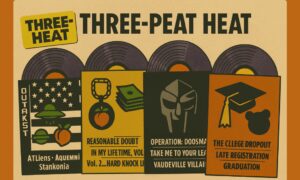
Let God Sort Em Out: Clipse Return With a Reckoning, Not a Reunion
White Lines, Holy Rhymes: Inside Clipse’s Divine Divide
Seventeen years since their last album together, Clipse didn’t come back for the nostalgia. They came to settle something bigger between each other, and with something higher. Let God Sort Em Out isn’t a reunion in the traditional sense. It’s a reckoning between past and present, brother and brother, belief and bravado.
Pusha T and No Malice may share DNA, but across this album, they rarely share perspective. While Pusha continues to double down on his immaculate coke rap legend, No Malice moves with the gravity of someone who’s glimpsed hell and doesn’t want to go back. What emerges is a concept album as divided as it is unified: two voices, one legacy, headed toward different eternities.
In some ways, the album is the culmination of everything that came before, from their gritty *We Got It 4 Cheap* mixtapes to their infamously delayed debut (read the shelved album story), through their classic LP Hell Hath No Fury and recent one-off singles like “So Be It”. Their return is less about reclaiming space and more about revealing what space they now occupy.
It also connects to recent reflections, such as this profile on No Malice’s return and broader retrospectives on how Clipse escaped label purgatory—again. Behind them is history. Ahead of them is the unknown.
- Last Classic album: Hell Hath No Fury (2006)
- Previous album: Til the Casket Drops (2009)
- In between: Pusha T became a solo titan; No Malice stepped away from mainstream rap, embraced faith
- Why it matters: This is their first full album together in 17 years, and they’re not the same men
Guilty Pleasures, Godly Measures: Clipse’s Dual Sermon
The title alone, Let God Sort Em Out, lays down the 8-ball. Clipse seeks absolution; it’s Clipse laying their case before the divine. The album doesn’t present a unified worldview, but rather two distinct interpretations of memory, morality, and what outside judgment means.
The Gospel of Glamour: Pusha’s Coke Commandments
- “whips,”
- “chains,”
- “kilos,”
- “diamonds,”
- “Maybach,”
- “relevance,”
- “bitch,”
- “fame,”
- “system,”
- “ice,”
- “snow,”
- “million,”
- “drought,”
- “Coke,”
- “president,”
- “designer,”
- “rep,”
- “enamel”
For Pusha, judgment is worldly. Success is salvation. In “Chains & Whips,” he flips pain into profit: “Beat the system with chains and whips.” In “So Far Ahead,” his line “I lap the guilt” shows how he views moral reckoning as an obstacle to outrun. His God is achievement. His gospel is luxury.
Confessions of a Coke-Rap Convert: No Malice’s Holy Vocabulary
- “god,”
- “forgiveness,”
- “truth,”
- “closet,”
- “message,”
- “church,”
- “skeleton,”
- “sins,”
- “mess,”
- “Mercy,”
- “grace,”
- “repentance,”
- “gospel,”
- “judgment,”
- “pray,”
- “blessing,”
- “truth,”
- “salvation”
No Malice wrestles with guilt, but not from a place of weakness. His arc is confessional. In “Ace Trumpets,” he raps, “Gabriel blew the trumpet, I walked out of the flames,” a lyrical resurrection. In “Let God Sort Em Out,” he warns, “Judgment comes whether we ready or not.” For him, morality isn’t an accessory; it’s the axis of his return.
The record’s emotional depth lies in its contradictions. Pusha doesn’t apologize, even when he mourns. No Malice doesn’t brag, even when he triumphs. Their memory splits the past into mirror images: one gleaming, one ghostly. Their morality splits into two visions—one defiantly mortal, the other divinely burdened.
Clipse Track-by-Track Analysis (Final Album Version)
1. “The Birds Don’t Sing” (feat. John Legend & Voices of Fire)
Pusha T:
“You even told Dad you wished y’all never splitted / See, you were checkin’ boxes, I was checkin’ my mentions” – mourning filtered through ego and regret.
No Malice:
“Your car was in the driveway, I knew you were home / By the third knock, a chill ran through my bones” – grief and mortality front and center.
The album’s opening track, “The Birds Don’t Sing,” is a mournful and deeply personal meditation on the loss of the Thornton brothers’ mother. John Legend’s haunting vocals and the gospel choir backdrop from Voices of Fire build a church-like solemnity.
Pusha T’s verse reflects on family grief filtered through disconnection and self-image, using social currency to mask emotional debt. No Malice’s contribution is more raw, describing the moment he confronted her death with visceral immediacy. For both, this track is not just an elegy but a spiritual reawakening, one that casts a long shadow over the rest of the album.
2. “Chains & Whips” (feat. Kendrick Lamar)
Pusha T:
“Beat the system with chains and whips” – provocative luxury-as-power metaphor.
No Malice:”
The whip ain’t freedom if you chained to it” – dismantles the metaphor, flips the critique inward.
“Chains & Whips” is a razor-edged cultural meditation wrapped in icy luxury. Pusha T and Kendrick Lamar portray the trappings of wealth, including chains, whips, and designer goods, as both symbols of defiance and residues of systemic control. Pusha flips the slaver’s tools into victory laps, while Kendrick stitches in cryptic doublespeak about power and history. But it’s No Malice who detonates the track’s deeper meaning. His line, “The whip ain’t freedom if you chained to it,” turns the metaphor inward, suggesting that even self-made success can be another form of bondage. The song doesn’t resolve this tension. It charges it with electricity. Kendrick and Push have already released a classic song.
3. “P.O.V.” (feat. Tyler, The Creator)
Pusha T:
“P.O.V., kilos in my Maybach” – returns to drug imagery as identity.
No Malice:
“If I didn’t give you both sides, I wouldn’t be me” – self-aware about duality and change.
“P.O.V.” is a meditation on perspective, control, and legacy. Over Tyler’s lush, disjointed production, Pusha T asserts dominance through the lens of street-earned vision, his past as an empire, not a stain. His ‘point of view’ is fixed: success validated by survival. No Malice offers contrast: “If I didn’t give you both sides, I wouldn’t be me,” acknowledging his former self while affirming his current faith. His verse is about reconciling those two visions, not erasing one of them. Together, the song becomes a philosophical sparring match between identity and reinvention.
4. “So Be It”
Pusha T:
“Floors are heated, so be it, so be it” – comfort without question.
No Malice:
“Let your mess become your message” – encapsulates the redemptive mission of his return.
“So Be It” serves as a minimalist thesis statement for both brothers. The title phrase functions like a mantra, resigned for one, redemptive for the other. Pusha T delivers his lines with icy detachment, embracing luxury and legacy with zero hesitation. His world doesn’t require explanation; it just needs acknowledgment. But No Malice turns the exact phrase into surrender: not to fate, but to grace. “Let your mess become your message” distills his entire post-conversion philosophy. The track is a perfect microcosm of their split paths: one unbothered, the other unburdened.
5. “Ace Trumpets”
No Malice:
“Gabriel blew the trumpet / I walked out the flames” – judgment and rebirth.
Pusha T:
“If God made me, blame the mold” – fatalism with a smirk.
“Ace Trumpets” plays like a prophetic call to arms. No Malice leans fully into end-times imagery, referencing Gabriel’s trumpet and divine fire, which evoke both the apocalypse and personal rebirth. His verse isn’t metaphor; it’s testimony, delivered like scripture.
Pusha T, by contrast, drops a line as slick as it is damning: “If God made me, blame the mold.” Where No Malice points skyward, Pusha deflects responsibility, continuing to revel in his life’s work. It’s about Bible vs. bravado. It’s a sermon vs. a shrug.
6. “All Things Considered” (feat. The-Dream & Pharrell Williams)
Pusha T:
“All things considered, I’m still that guy” – doubling down on legacy.
No Malice:
“I reconsidered all things” – self-reflection wrapped in scripture.
“All Things Considered” earns the album’s second most emotional track (after “The Birds Don’t Sing.}. Pusha T delivers his verse like a performance review, boasting that despite betrayals and storms, his resume is intact: “All things considered, I’m still that guy.”
His tone is less venomous than usual, measured, almost weary. No Malice approaches the phrase from the opposite angle: “I reconsidered all things.” His verse plays like a Pauline conversion, combing through past achievements and reclassifying them as empty. The-Dream and Pharrell’s melodic textures help soften the track’s gravity, but the internal audit each brother conducts is as complex as ever.
7. “M.T.B.T.T.F.”
Pusha T:
“Meant to be the villain” – leans into his public image.
No Malice:
“Meant to bring the truth” – flips the same acronym into a new mission.
“M.T. B.T.T.F.” is the most cryptic track title on the record, presumably an acronym for “Meant To Be The Truth/Figure/Foe.” True to its name, the song doubles as a mirrored affirmation. Pusha T embodies the villain role with theatrical ease: “Meant to be the villain,” it’s a defiance that serves as branding. Meanwhile, No Malice reinterprets the same phrase to assert spiritual duty: “Meant to bring the truth.” This shared phrase, differently inflected, underscores their diverging paths. The track plays like a mission statement split down the middle, half rebellion, half revelation.
8. “E.B.I.T.D.A.” (feat. Pharrell Williams)
Pusha T:
“Earnings before I even spoke” – wealth as prophecy.
No Malice:
“It’s not profit if you lose your soul” – spiritual checkmate.
“E.B.I.T.D.A.” borrows its title from a financial term, Earnings Before Interest, Taxes, Depreciation, and Amortization—but reworks it into a metaphor for legacy beyond accounting. Pusha T flexes with trademark bravado: “Earnings before I even spoke,” turning wealth into a birthright. No Malice counters with a sobering inversion: “It’s not profit if you lose your soul.” Pharrell’s production, smooth and minimal, allows the tension to simmer. This isn’t about balance sheets. It’s about eternal ledgers. The spiritual economics of the track frames both brothers’ lives as rival investment strategies: one rooted in dividends, the other in deliverance.
9. “F.I.C.O.” (feat. Stove God Cooks)
Pusha T:
“Credit good, conscience clean enough” – morally ambiguous flex.
No Malice:
“Debts forgiven, not just cleared” – divine economy.
“F.I.C.O.” plays with credit, both financial and moral. Named after the credit score system, Pusha T’s verse twists consumer trust into a cold flex: “Credit good, conscience clean enough,” a line that sounds like absolution but reeks of indifference. Stove God Cooks joins him in the swagger, but No Malice again takes the road less traveled. “Debts forgiven, not just cleared” reframes debt in spiritual terms, suggesting that true freedom isn’t just financial solvency, it’s soul redemption. The song becomes a clash between transactional and transformational mindsets.
10. “Inglorious Bastards” (feat. Ab-Liva)
Pusha T:
“No medals for our kind” – overlooked brilliance.
No Malice:
“We weren’t righteous, just raw” – honest indictment.
“Inglorious Bastards” is a meditation on legacy, erasure, and street nobility. Pusha T reflects on being excluded from mainstream acclaim: “No medals for our kind” is both a lament and a badge of honor. He wears rejection like armor. No Malice, though, breaks the fourth wall: “We weren’t righteous, just raw,” confessing that what once passed for authenticity now reads as spiritual deficit. With Ab-Liva adding grit and ghostlines, the track plays like a war story from soldiers who survived the battlefield—but not unchanged.
11. “So Far Ahead” (feat. Pharrell Williams)
Pusha T:
“So far ahead, I lap the guilt” – unapologetically distant.
No Malice:
“So far ahead, I found peace” – spiritual evolution.
“So Far Ahead” captures the diverging spiritual velocities of Clipse. Pusha T uses the phrase to flex his distance from guilt and accountability, boasting that he’s outpaced remorse itself. His success, in this context, is so complete that reflection is rendered irrelevant. No Malice, however, uses that same distance to describe transcendence, having moved beyond ego and pain. “So far ahead, I found peace” is not a flex, but a quiet revelation. Pharrell’s ethereal hook binds both visions together, creating a track that feels like a slow ascent or a final departure.
12. “Let God Sort Em Out / Chandeliers” (feat. Nas)
Pusha T:
“Tell the reverend I’m good where I’m at” – rejects redemption.
No Malice:
“Judgment comes whether we ready or not” – accepts accountability.
The title track isn’t a celebration—it’s a confrontation. “Let God Sort Em Out / Chandeliers” is the album’s moral climax. Pusha T waves off spiritual intervention: “Tell the reverend I’m good where I’m at,” asserting his sovereignty with a shrug. It’s not just defiance—it’s finality. No Malice, meanwhile, stands before the throne:
“Judgment comes whether we ready or not.”
His tone is solemn, even urgent. The addition of Nas, hip-hop’s resident prophet, sharpens the contrast. His verse hovers between both worlds—legacy and accountability. The second movement, “Chandeliers,” softens into eerie reflection. The track suggests one fate, two routes.
13. “By the Grace of God” (feat. Pharrell Williams)
Pusha T:
“By grace, or by grind—I made it” – dualism unresolved.
No Malice:
“Grace alone, not grind” – closes with theological clarity.
“By the Grace of God” closes the album not with resolution, but with revelation. Pharrell’s shimmering production gives the track a celestial lift, setting the stage for final statements. Pusha T acknowledges divine possibility but never yields control: “By grace, or by grind—I made it.” His dualism remains intact; success could be a result of providence or persistence. No Malice, however, draws a line in the sand: “Grace alone, not grind.” It’s a theological mic drop that underscores the difference between performance and faith. The song doesn’t tie the album together—it pulls it taut, asking listeners to decide which brother speaks their truth.
This album doesn’t try to tie everything up. It puts the contrast right in front of you. Pusha T is still the king of diamond-hard bars and snow-rich metaphors. No Malice is the prodigal who didn’t come back to stay; he came back to testify. Together, they make Let God Sort Em Out one of the most thematically heavy hip-hop albums in years.
It’s not really about who came out on top. It’s about who’s willing to face the music.
Let God Sort Em Out is out now on Mass Appeal/Def Jam.














